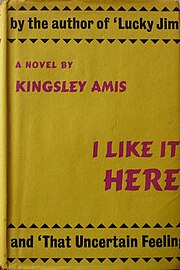
Sir Kingsley William Amis was an English novelist, poet, critic, and teacher. He wrote more than 20 novels, six volumes of poetry, a memoir, short stories, radio and television scripts, and works of social and literary criticism. He is best known for satirical comedies such as Lucky Jim (1954), One Fat Englishman (1963), Ending Up (1974), Jake's Thing (1978) and The Old Devils (1986). His biographer Zachary Leader called Amis "the finest English comic novelist of the second half of the twentieth century." He is the father of the novelist Martin Amis. In 2008, The Times ranked him ninth on a list of the 50 greatest British writers since 1945.

Saul Bellow was a Canadian-born American writer. For his literary work, Bellow was awarded the Pulitzer Prize, the Nobel Prize for Literature, and the National Medal of Arts. He is the only writer to win the National Book Award for Fiction three times and he received the National Book Foundation's lifetime Medal for Distinguished Contribution to American Letters in 1990.

Philip Arthur Larkin was an English poet, novelist, and librarian. His first book of poetry, The North Ship, was published in 1945, followed by two novels, Jill (1946) and A Girl in Winter (1947), and he came to prominence in 1955 with the publication of his second collection of poems, The Less Deceived, followed by The Whitsun Weddings (1964) and High Windows (1974). He contributed to The Daily Telegraph as its jazz critic from 1961 to 1971, with his articles gathered in All What Jazz: A Record Diary 1961–71 (1985), and edited The Oxford Book of Twentieth Century English Verse (1973). His many honours include the Queen's Gold Medal for Poetry. He was offered, but declined, the position of Poet Laureate in 1984, following the death of Sir John Betjeman.
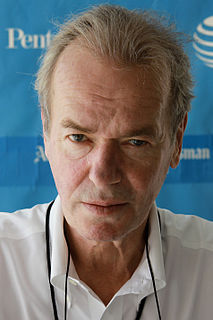
Martin Louis Amis is a British novelist, essayist, memoirist, and screenwriter. He is best known for his novels Money (1984) and London Fields (1989). He received the James Tait Black Memorial Prize for his memoir Experience and has been listed for the Booker Prize twice. Amis served as the Professor of Creative Writing at the Centre for New Writing at the University of Manchester until 2011. In 2008, The Times named him one of the fifty greatest British writers since 1945.
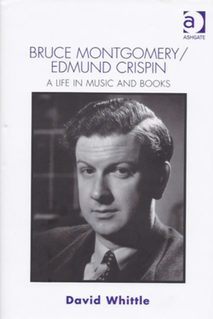
Edmund Crispin was the pseudonym of Robert Bruce Montgomery, an English crime writer and composer known for his Gervase Fen novels and for his musical scores for the early films in the Carry On series.
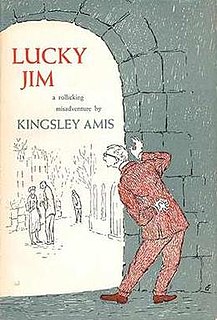
Lucky Jim is a novel by Kingsley Amis, first published in 1954 by Victor Gollancz. It was Amis's first novel and won the 1955 Somerset Maugham Award for fiction. The novel follows the exploits of the eponymous James (Jim) Dixon, a reluctant lecturer at an unnamed provincial English university.
John Barrington Wain CBE was an English poet, novelist, and critic, associated with the literary group known as "The Movement". He worked for most of his life as a freelance journalist and author, writing and reviewing for newspapers and the radio.

Terence Francis Eagleton is an English literary theorist, critic, and public intellectual. He is currently Distinguished Professor of English Literature at Lancaster University.

Brunette Coleman was a pseudonym used by the poet and writer Philip Larkin. In 1943, towards the end of his time as an undergraduate at St John's College, Oxford, he wrote several works of fiction, verse and critical commentary under that name, including homoerotic stories that parody the style of popular writers of contemporary girls' school fiction.
Reginald Ashley Caton (1897–1971) was an English publisher. He appears as a literary character, especially in novels by Kingsley Amis.

Colonel Sun is a novel by Kingsley Amis published by Jonathan Cape on 28 March 1968 under the pseudonym "Robert Markham". Colonel Sun is the first James Bond continuation novel published after Ian Fleming's 1964 death. Before writing the novel, Amis wrote two other Bond related works, the literary study The James Bond Dossier and the humorous The Book of Bond. Colonel Sun centres on the fictional British Secret Service operative James Bond and his mission to track down the kidnappers of M, his superior at the Secret Service. During the mission he discovers a communist Chinese plot to cause an international incident. Bond, assisted by a Greek spy working for the Russians, finds M on a small Aegean island, rescues him and kills the two main plotters: Colonel Sun Liang-tan and a former Nazi commander, Von Richter.

Licence Renewed, first published in 1981, is the first novel by John Gardner featuring Ian Fleming's secret agent, James Bond. It was the first proper James Bond novel since Kingsley Amis's Colonel Sun in 1968. Carrying the Glidrose Publications copyright, it was first published in the United Kingdom by Jonathan Cape and in the United States by Richard Marek, a G. P. Putnam's Sons imprint.

The Old Devils is a novel by Kingsley Amis, first published in 1986. The novel won the Booker Prize.

The Alteration is a 1976 alternative history novel by Kingsley Amis, set in a parallel universe in which the Reformation did not take place. It won the John W. Campbell Memorial Award in 1977.
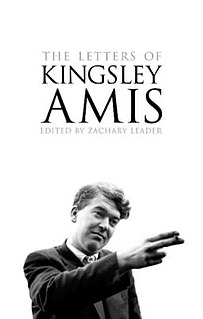
The Letters of Kingsley Amis (2001) was assembled and edited by the American literary critic Zachary Leader. It is a collection of more than 800 letters from Amis to many different friends and professional acquaintances from 1941 until shortly before his death in 1995. About one quarter of the letters selected were addressed to Amis's close friend, the poet Philip Larkin.

Larkin at Sixty (1982) is a collection of original essays and poems published to celebrate the sixtieth birthday of the English poet Philip Larkin. It was edited and introduced by Anthony Thwaite and published by Larkin's publishers, Faber and Faber. A poetic dramatisation of the launch of the book was written by Russell Davies.
Throughout the life of the poet Philip Larkin, multiple women had important roles which were significant influences on his poetry. Since Larkin's death in 1985, biographers have highlighted the importance of female relationships on Larkin: when Andrew Motion's biography was serialised in The Independent in 1993, the second installment of extracts was dedicated to the topic. In 1999, Ben Brown's play Larkin with Women dramatised Larkin's relationships with three of his lovers, and more recently writers such as Martin Amis, continued to comment on this subject.

Lemmons, also known as Gladsmuir and Gladsmuir House, was the home of novelists Kingsley Amis (1922–1995) and Elizabeth Jane Howard (1923–2014) on the south side of Hadley Common, Barnet, on the border of north London and Hertfordshire.

The Anti-Death League is a 1966 novel by English author Kingsley Amis (1922–1995). Set in England, it follows the lives of characters working in and around a fictional British Army camp where a secret weapon is being tested.
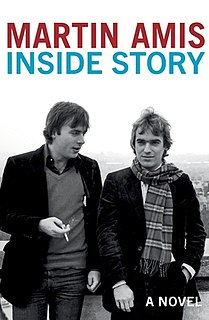
Inside Story is an autobiographical novel by the English author Martin Amis, published in 2020.
